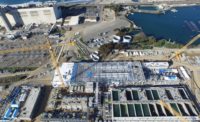Global Desalination Pioneer IDE Finds Buyer
An Israeli chemical manufacturer has finalized the sale of its 50% stake in global water desalination pioneer IDE Technologies Ltd., also based in Israel, to a domestic investor group for $177.5 million. It includes firm CEO Avshalom Felber and an Israeli teachers' pension fund and is set to close later this year.
The sale price was about half of a reported offer last year by China Communication and Construction Co. Israeli financial industry sources said the deal fell through.
Several years earlier, Hong Kong-based Hutchison Whampoa reportedly was also in talks to buy IDE for as much as $800 million. The sources said that the drop in IDE's value is largely the result of a decline in projects in the domestic desalination market as well as abroad.
Still owning the remaining 50% is Israeli conglomerate Delek Group, which is said to be holding out for a higher price for its stake and a recovery in the desalination market. Delek and the chemicals firm are said to be returning to core asset ownership.
IDE itself holds a 50% stake in Israel's three largest desalination plants, located along the Mediterranean coast at Ashkelon, Hadera and Soreq, with a combined production of over 450 million cu meters per year. The firm has provided technology, equipment and operations and maintenance.
With little new work in Israel, the company has focused its efforts in recent years abroad and built plants in China, India, Chile and Australia.
In 2013 IDE won the tender to build the largest desalination plant in North America at Carlsbad, Calif. It opened last year.
In May, IDE said it had completed reactivation of a plant in Santa Barbara, Calif. The plant will satisfy 30% of demand. The city had selected IDE to design, build and operate it.
Joshua Haggmark, Santa Barbara's water resources manager, said the facility's design "includes high-efficiency pumps and motors that reduce the plant's overall electrical demands by 40% compared to the last plant. Restarting this plant puts the city in a position to better manage water shortages through a more diversified supply mix." That includes local surface water, state water, groundwater, recycled water, water conservation and now desalinated water, he said.
According to an Associated Press report, Santa Barbara built the plant for emergency supply after a 1980s water crisis, but it only operated briefly in 1992 because of abundant rainfall. The City Council voted to reactivate the plant in the wake of the most recent drought when extensive water conservation measures were put in place.
Despite plans for other plants in California and Mexico, including what is set to be the Western Hemisphere's largest, a recent report by GMR Data forecast that the five-year growth for the desalination industry would fall below 5% for the first time in 20 years due to financial uncertainty in several Middle East countries.
In addition, the report predicted that from 2021 to 2026 many global regions will move away from brand new projects and focus instead on new technology at existing sites.
IDE has branched out into water treatment. In March 2016 the firm and its Indian partner VA Tech Wabag Ltd won a $100-million contract in Chennai for construction, maintenance and operation of a tertiary water-treatment plant.
The project will use ultra-filtration and reverse osmosis technology to treat wastewater and then pipe it to industrial plants dozens of kilometers away.


